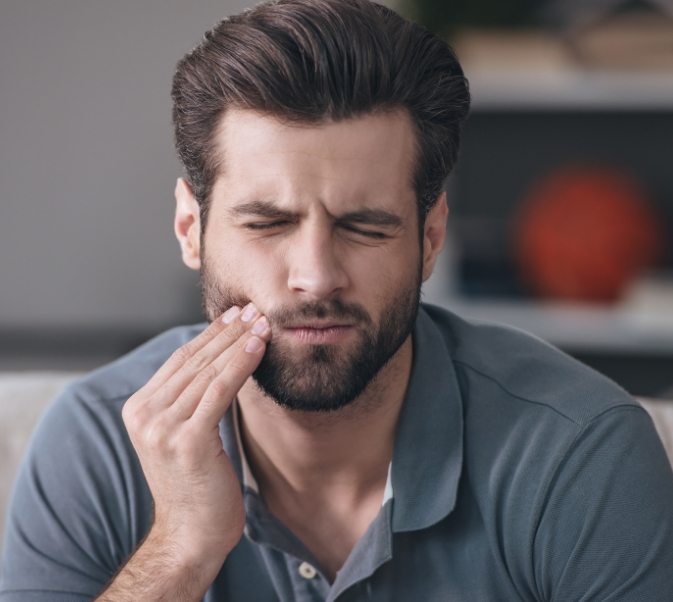Emergency Dentist El Reno
Fast & Effective Dental Care Right When You Need It

Rather than waiting for a dental injury to occur and then searching for an emergency dentist online, you can save yourself a lot of stress and wasted time by putting El Reno Family Dentistry’s number in your phone right now. Should your child develop a toothache, or you injure one of your own teeth, you can give us a call immediately, and a member of our team will schedule a same-day appointment for you. This allows us to turn your dental mishap into a distant memory as quickly as possible with emergency dentistry in El Reno, OK.
Why Choose El Reno Family Dentistry for Emergency Dentistry?
- Same-Day Appointments Available
- Sedation Dentistry for Nervous Patients
- We’ll Work to Maximize Your Dental Benefits
I Need a Checkup & Cleaning I am Worried About Gum Disease I Need a Dentist for My Child I Have a Cavity or Broken Tooth I am Missing One or More Teeth I Want to Enhance My Smile I Want a Straighter Smile I Have Jaw Pain I am Scared of the Dentist View Our Services
How We Treat Dental Emergencies

Treating dental emergencies requires calling our office to schedule a same-day appointment. Based on the severity of your injury, we will work to get you in as quickly as we can so that you can begin to receive the treatment you need. A member of our team will escort you to a treatment room when you arrive so that digital images can be captured and reviewed. Dr. Jackson or Dr. Parsons will then review the findings to determine how best to move forward. After a thorough treatment plan is created, we will administer care so that you are no longer in pain and can walk away with a damage-free smile.
The Most Common Dental Emergencies
At El Reno Family Dentistry, we treat all kinds of dental emergencies, many of which are listed below. Here, you can learn more about how we administer care as well as what you can do while at home to manage the pain.
Understanding the Cost of Dental Emergencies

Like medical emergencies, the cost of emergency dental treatment varies based on the type and extent of the injury as well as the procedure needed to address it. When you come to see us, we’ll give you an exam and go over your options before starting any treatment. We’ll also discuss how we can use your insurance and financing options to help fit whatever you need comfortably into your budget.
Keys to Preventing Dental Emergencies

- No matter the sport, always wear a mouthguard while playing.
- Don’t chew hard items like ice, pens, popcorn kernels, fingernails, etc.
- Don’t use your teeth to open packages, bottles, or remove tags from clothing.
- Brush and floss every night—this will prevent the small problems that can turn into big emergencies later.
- Look up while you’re walking—many patients accidentally trip or run into things and injure their teeth because they are looking down at their phones!
Dental Emergency FAQS
Do you accept dental emergency walk-ins?
We’re always here to help during a dental emergency and would never turn away someone in urgent need. That said, calling ahead is the best way to make sure you’re seen as quickly as possible. Although we set aside time each day for emergencies, walk-ins might still experience delays depending on the day’s schedule. A quick call lets us prepare for your arrival and give you the prompt care you deserve.
Should I go to the ER for a dental emergency?
Generally, the ER isn’t the right place for most dental emergencies. While they can offer pain relief and possibly antibiotics, they usually aren’t equipped to solve dental issues directly. Visiting an emergency dentist in El Reno like us ensures the root of the problem is addressed and your discomfort is relieved for good. However, if the emergency involves severe facial trauma, uncontrollable bleeding, difficulty breathing, or a suspected broken jaw, head to the ER first for immediate medical attention.
How much does emergency dentistry cost?
The cost of emergency dentistry varies depending on what needs to be done. Some issues might only need a simple treatment, like a filling or prescription, while others could require more involved care like a root canal or extraction. When you visit us, we’ll focus on relieving your pain right away. After that, we’ll explain your treatment options, associated costs, expected timeline, and how insurance or financing might help.
Does dental insurance cover emergency dentistry?
In many situations, yes, dental insurance can help cover emergency care, from diagnostics like X-rays to treatments such as crowns or extractions. Your actual coverage depends on your specific plan, how much of your deductible you've met, and other factors. Before moving forward with any major treatment, we’ll go over the costs with you and help you understand what’s covered. And if you don’t have insurance, we also provide flexible financing options through CareCredit to make things easier.
